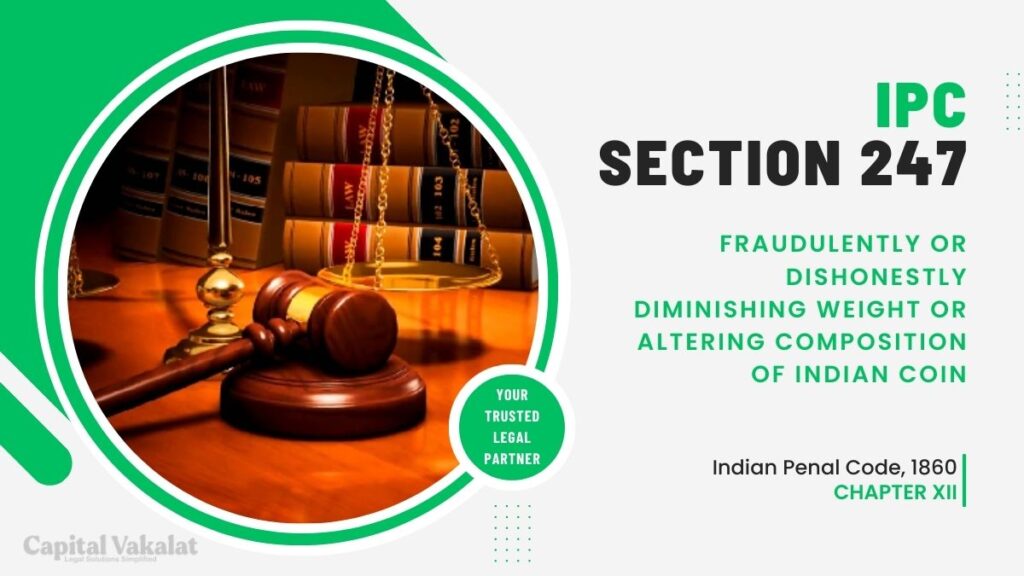In a world where currency is the lifeblood of an economy, ensuring the integrity of a nation’s coinage is paramount. Section 247 of the Indian Penal Code (IPC) addresses a specific aspect of coinage integrity by dealing with offenses related to fraudulently or dishonestly diminishing the weight or altering the composition of Indian coins.

This article explores the various facets of this legal provision and its implications.
Introduction to Section 247 IPC
Section 247 IPC is a significant legal provision in India that focuses on maintaining the purity and weight of Indian currency. It criminalizes any act that involves fraudulent or dishonest practices related to diminishing the weight or altering the composition of Indian coins. The aim of this provision is to safeguard the trust in the nation’s currency system and prevent economic disruption.
Understanding Fraudulent or Dishonest Diminishing of Weight
Diminishing the weight of a coin involves reducing its metal content while maintaining its appearance. Fraudulent practices like shaving, clipping, or filing the edges of coins to extract metal are common examples. Such actions devalue the currency and can lead to financial losses for individuals and the state.
Understanding Alteration of Composition
Altering the composition of a coin means changing its metal content to deceive others about its value. This can involve adding cheaper metals to the coin’s alloy or using materials that mimic the original metal. These alterations can be difficult to detect, making it a covert form of currency manipulation.
Historical Background of Coinage in India
The history of coinage in India is rich and diverse, dating back to ancient times. Various dynasties and rulers issued their own coinage, reflecting the cultural and economic dynamics of their eras. Coinage integrity has been a concern for centuries, with emperors like Akbar issuing royal edicts to ensure the purity of currency.
Importance of Coinage Integrity
Maintaining the integrity of coinage is essential for a stable economy. If the trust in the currency is eroded due to fraudulent practices, it can lead to economic instability, inflation, and a loss of confidence in the government’s ability to manage the financial system.
Offenses under Section 247 IPC
Section 247 IPC outlines specific offenses related to coinage. It includes counterfeiting, making or possessing any instrument for counterfeiting, diminishing the weight or altering the composition of a coin, or possessing such altered coins with the intent to defraud.
Legal Consequences and Penalties
The legal consequences for offenses under Section 247 IPC can be severe. Offenders can face imprisonment and fines. The severity of the punishment depends on the nature and scale of the offense. Additionally, the courts may order the forfeiture of any counterfeit or altered coins.
Challenges in Enforcing the Law
Enforcing Section 247 IPC presents certain challenges. Detecting altered or counterfeit coins can be a complex task, often requiring advanced technology and expertise. Moreover, bringing offenders to justice can be difficult due to the covert nature of such activities.
Real-Life Cases
To illustrate the significance of Section 247 IPC, we can examine real-life cases of coinage fraud in India. These cases shed light on the impact of such offenses and the measures taken to address them.
Preventive Measures and Conclusion
Preventing coinage fraud is crucial to maintain economic stability and public trust. To conclude, this article emphasizes the importance of Section 247 IPC in upholding the integrity of Indian coinage. It serves as a deterrent to those who would engage in fraudulent practices and plays a vital role in preserving the nation’s economic security.
Frequently Asked Questions
How can one identify altered or counterfeit coins?
Identifying altered or counterfeit coins can be challenging. Genuine coins typically have specific weight and composition characteristics. Altered coins may show signs of tampering, like uneven edges, unusual weight, or a different metallic composition. However, advanced testing may be needed to confirm authenticity.
What historical context led to the creation of Section 247 IPC?
Section 247 IPC has its roots in India’s historical concerns about coinage integrity. Over the centuries, rulers and emperors recognized the importance of maintaining trust in currency. This legal provision evolved to address various forms of coin manipulation and fraud.
What measures can individuals and businesses take to protect themselves from coinage fraud?
To protect against coinage fraud, individuals and businesses should be cautious when handling coins. They can use coin-checking devices, seek guidance from experts, and stay informed about the latest security features in currency. Being vigilant and educated is essential in detecting counterfeit or altered coins.
Are there any recent developments or amendments to Section 247 IPC?
As of my last knowledge update in January 2022, there were no specific recent developments or amendments to Section 247 IPC. However, it’s advisable to consult the latest legal sources and updates from the Indian government for any changes to this provision.